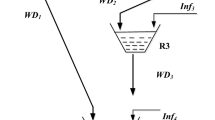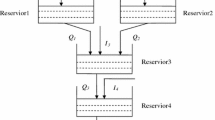Abstract
In this research work, an integrated optimization technique has been proposed by coordinating gravitational search algorithm (GSA) and predator–prey optimization (PPO) in a suitable manner to improve the search capability of algorithm. The integrated technique is applied to obtain the optimum generation schedule of hydro-thermal generation system considering some of the practical constraints and transmission losses. For the hydro-thermal systems, the multi-chain hydro model has been undertaken with due consideration of water transport delay between reservoirs. In PPO algorithm, the search is performed by considering the experience of other prey particles along with the effect of predator particle. The predator effect helps to avoid any possible stagnation of global best prey on local optima due to the fear created by predator particle. In PPO algorithm, the quality of the solutions has not been considered while updating the position of prey or predator, whereas in GSA, the agent direction is computed based on the overall force, and it is proportional to the quality of the solutions. Further, GSA is memory less and agent direction is not influenced by best positions. In the proposed integrated technique, the position of agent/prey is directed by overall force around themselves, global best prey position and predator effect. The proposed integrated technique is tested on three hydro-thermal systems. A penalty-free constraint handling approach is employed to satisfy all equality and inequality constraints. The results obtained from proposed technique have been compared with the results reported with the existing technique, and it is experienced that proposed technique is able to provide a better solution with improved convergence characteristics. The statistical analysis of results is also done to measure the sensitivity and robustness of the proposed technique.














Similar content being viewed by others
References
Basu M (2010) Economic environmental dispatch of hydrothermal power system. Int J Electr Power Energy Syst 32(6):711–720
Li CA, Philip J, Jap J, Dan L, Streiffert L (1993) Implementation of network flow programming to the hydrothermal coordination in an energy management system. IEEE Trans Air Power Syst 8(3):1045–1053
Wood AJ, Wollenberg BF (2007) Power generation, operation and control, 2nd edn. John Wiley and Sons press, New York
Gorenstin BG, Campodonico NM, Costa JP, Pereira MVF (1992) Stochastic optimization of a hydro-thermal system including network constraints. IEEE Trans Power Syst 7(2):791–797
Yang JS, Chen N (1989) Short-term hydrothermal coordination using multi-pass dynamic programming. IEEE Trans Power Syst 4(3):1050–1056
Chen P-H, Chang H-C (1996) Genetic aided scheduling of hydraulically coupled plants in hydro-thermal coordination. IEEE Trans Power Syst 11(2):975–981
Senthil Kumar V, Mohan MR (2011) A genetic algorithm solution to the optimal short-term hydrothermal scheduling. Int J Electr Power Energy Syst 33(4):827–835
Hota PK, Chakrabarti R, Chattopadhyay PK (1999) Short-term hydrothermal scheduling through evolutionary programming technique. Electr Power Syst Res 52(1):189–196
Cau TDH, Kaye RJ (2002) Evolutionary optimisation method for multistorage hydrothermal scheduling. IEE Proc Gener Transm Distrib 149(2):152–156
Mandal KK, Chakrabotry N (2013) Parameter study of differential evolution based optimal scheduling of hydrothermal systems. J Hydro Environ Res 7(1):72–80
Zhang J, Lin S, Qiu W (2015) A modified chaotic differential evaluation algorithm for short-term optimal hydrothermal scheduling. Int J Electr Power Energy Syst 65:159–168
Mandal KK, Basu M, Chakrabotry N (2008) Particle swarm optimization technique based short-term hydrothermal scheduling. Appl Soft Comput 8(4):1392–1399
Mandal KK, Chakrabotry N (2011) Short-term combined economic emission scheduling of hydrothermal systems with cascaded reservoirs using particle swarm optimization technique. Appl Soft Comput 11(1):1295–1302
Liao X, Zhou J, Ouyang S, Zhang R, Zhang Y (2013) An adaptive chaotic artificial bee colony algorithm for short-term hydrothermal generation scheduling. Int J Electr Power Energy Syst 53:34–42
Kumar Roy P (2013) Teaching learning based optimization for short-term hydrothermal scheduling problem considering valve point effect and prohibited discharge constraint. Int J Electr Power Energy Syst 53:10–19
Nguyen TT, Vo DN, Truong AV (2014) Cuckoo search algorithm for short-term hydrothermal scheduling. Appl Energy 132:276–287
Wong SYW (2001) Hybrid simulated annealing/genetic algorithm approach to short-term hydro-thermal scheduling with multiple thermal plants. Int J Electr Power Energy Syst 23(7):565–575
Sivasubramani S, Swarup KS (2011) Hybrid DE-SQP algorithm for non-convex short term hydrothermal scheduling problem. Energy Convers Manag 52(1):757–761
Roy PK (2014) Hybrid chemical reaction optimization approach for combined economic emission short-term hydrothermal scheduling. Electr Power Compon Syst 42(15):1647–1660
Fang N, Zhou J, Zhang R, Liu Y, Zhang Y (2014) A hybrid of real coded genetic algorithm and artificial fish swarm algorithm for short-term optimal hydrothermal scheduling. Int J Electr Power Energy Syst 62:617–629
Columbus CC, Chandrasekaran K, Simon SP (2012) Nodal ant colony optimization for solving profit based unit commitment problem for GENCOs. Appl Soft Comput 12:145–160
Aghaei J, Ahmadi A, Shayanfar HA, Rabiee A (2013) Mixed integer programming of generalized hydro-thermal self-scheduling of generating units. Electr Eng 95:109–125
Aghaei J, Ahmadi A, Rabiee A, Agelidis VG, Muttaqi KM, Shayanfar HA (2015) Uncertainty management in multiobjective hydro-thermal self-scheduling under emission considerations. Appl Soft Comput 37:737–750
Aghaei J, Karami M, Muttaqi KM, Shayanfar HA, Ahmadi A (2015) MIP-Based stochastic security-constrained daily hydrothermal generation scheduling. IEEE Syst J 9:615–628
Ahmadi A, Aghaei J, Shayanfar HA, Rabiee A (2012) Mixed integer programming of multiobjective hydro-thermal self scheduling. Appl Soft Comput 12:2137–2146
Karami M, Shayanfar HA, Aghaei J, Ahmadi A (2013) Scenario-based security-constrained hydrothermal coordination with volatile wind power generation. Renew Sustain Energy Rev 28:726–737
Rashedi E, Nezamabadi-pour H, Saryazdi S (2009) GSA: a gravitational search algorithm. Inf Sci 179:2232–2248
Shaw B, Mukherjee V, Ghoshal SP (2014) Solution of reactive power dispatch of power systems by an opposition-based gravitational search algorithm. Int J Electr Power Energy Syst 55:29–40
Sarker J, Goswami SK (2014) Solution of multiple UPFC placement problems using gravitational search algorithm. Int J Electr Power Energy Syst 55:531–541
Bhowmik AR, Chakraborty AK (2014) Solution of optimal power flow using nondominated sorting multi objective gravitational search algorithm. Int J Electr Power Energy Syst 62:323–334
Bhattacharya A, Roy PK (2012) Solution of multi-objective optimal power flow using gravitational search algorithm. IET Gener Transm Distrib 6(8):751–763
Gouthamkumar N, Sharma V, Naresh R (2015) An oppositional learning based gravitational search algorithm for short term hydrothermal scheduling. Asian J Curr Eng Maths 4(3):45–54
Mirjalili S, Hashim SZM, Sardroudi HM (2012) Training feedforward neural networks using hybrid particle swarm optimization and gravitational search algorithm. Appl Math Comput 218(22):11125–11137
Woodward JR, Neil JR (2003) No free lunch program induction and combinatorial problems, chapter genetic programming, volume 2610 of the series lecture notes in computer science, pp 475–484
Tan WS, Hassan MY, Rahman HA, Abdullah MP, Hussin F (2013) Multi-distributed generation planning using hybrid particle swarm optimisation-gravitational search algorithm including voltage rise issue. IET Gener Transm Distrib 7(9):929–942
Mallick S, Ghoshal SP, Acharjee P, Thakur SS (2013) Optimal static state estimation using improved particle swarm optimization and gravitational search algorithm. Int J Electr Power Energy Syst 52:254–265
Radosavljević J, Klimenta D, Jevtić M, Arsić N (2015) Optimal power flow using a hybrid optimization algorithm of particle swarm optimization and gravitational search algorithm. Electr Power Compon Syst 43(17):1958–1970
Jiang S, Ji Z, Shen Y (2014) A novel hybrid particle swarm optimization and gravitational search algorithm for solving economic emission load dispatch problems with various practical constraints. Int J Electr Power Energy Syst 55:628–644
Yuan X, Ji B, Chen Z, Chen Z (2014) A novel approach for economic dispatch of hydrothermal system via gravitational search algorithm. Appl Math Comput 247:535–546
Park JB, Lee KS, Shin JR, Lee KY (2005) A particle swarm optimization for economic dispatch with non-smooth cost functions. IEEE Trans Power Syst 20(1):34–42
Omran M, Engelbrecht A, Salman A (2009) Bare bones differential evolution. Eur J Oper Res 196(1):128–139
Mo Y, Liu H, Wang Q (2009) Conjugate direction particle swarm optimization solving systems of nonlinear equations. Comput Math Appl 57(11–12):1877–1882
Silva A, Neves A, Costa E (2002) An empirical comparison of particle swarm and predator prey optimization. Proc Irish Int Conf Artif Intell Cognit Sci 24(64):103–110
Narang N, Dhillon JS, Kothari DP (2012) Multiobjective fixed head hydrothermal scheduling using integrated predator-prey optimization and Powell search method. Energy 47(1):237–252
Silva A, Neves A, Costa E (2002) Chasing the swarm: a predator prey approach to function optimization. In: Proceeding of MENDEL 2002-8th international conference on soft computing, Brno, Czech Republic, June 5–7
Higashitani M, Ishigame A, Yasude K (2006) Particle swarm optimization considering the concept of predator-prey behavior. In: IEEE congress on evolutionary computation, Canada, July 16–21
Narang N, Dhillon JS, Kothari DP (2012) Multi-objective short-term hydrothermal generation scheduling using predator-prey optimization. Electr Power Compon Syst 40(15):1708–1730
Narang N, Dhillon JS, Kothari DP (2014) Scheduling short-term hydrothermal generation using predator prey optimization technique. Appl Soft Comput 21:298–308
Narang N, Dhillon JS, Kothari DP (2014) Weighted pattern evaluation for multiobjective hydrothermal generation scheduling using hybrid search technique. Int J Electr Power Energy Syst 62:665–678
Orero SO, Irving MR (1998) A genetic algorithm modelling framework and solution technique for short-term optimal hydrothermal scheduling. IEEE Trans Power Syst 13(2):501–518
Mirjalili S, Hashim SZM (2010) A new hybrid PSOGSA algorithm for function optimization. In: International conference on computer and information application (ICCIA 2010), pp 374–377
Park J-B, Jeong Y-W, Shin J-R, Kwang YL (2010) An improved particle swarm optimization for nonconvex economic dispatch problems. IEEE Trans Power Syst 25(1):156–166
Manoharan PS, Kannan PS, Baskar S, Iruthayarajan MW (2008) Penalty parameter-less constraint handling scheme based evolutionary algorithm solutions to economic dispatch. IET Gener Transm Distrib 2(4):478–490
Singh NJ, Dhillon JS, Kothari DP (2016) Synergic predator-prey optimization for economic thermal power dispatch problem. Appl Soft Comput. doi:10.1016/j.asoc.2016.02.042
Bhattacharjee K, Bhattacharya A, nee Dey SH (2014) Oppositional real coded chemical reaction based optimization to solve short-term hydrothermal scheduling problems. Int J Electr Power Energy Syst 63:145–157
Swain RK, Barisal AK, Hota PK, Chakrabarti R (2011) Short-term hydrothermal scheduling using clonal selection algorithm. Int J Electr Power Energy Syst 33(3):647–656
Norouzi MR, Ahmadi A, Sharaf AM, Nezhad AE (2014) Short-term environmental/economic hydrothermal scheduling. Electr Power Syst Res 116:117–127
Sun C, Lu S (2010) Short-term economic emission hydrothermal scheduling using improved quantum-behaved particle swarm optimization. Expert Syst Appl 37(6):4232–4241
Lakshminarasimman L, Subramanian S (2006) Short-term scheduling of hydrothermal power system with cascaded reservoirs by using modified differential evolution. IEE Proc Gener Transm Distrib 153(6):693–700
Lakshminarasimman L, Subramanian S (2008) A modified hybrid differential evolution for short-term scheduling of hydrothermal power systems with cascaded reservoirs. Energy Convers Manag 49(10):2513–2521
Basu M (2016) Quasi-oppositional group search optimization for hydrothermal power system. Int J Electr Power Energy Syst 81:324–335
Basu M (2014) Improved differential evolution for short-term hydrothermal scheduling. Int J Electr Power Energy Syst 58:91–100
Mandal KK, Chakrabotry N (2008) Differential evolution technique-based short-term economic generation scheduling of hydrothermal systems. Electr Power Syst Res 78(11):1972–1979
Zhang J, Wang J, Yue C (2012) Small population-based particle swarm optimization for short-term hydrothermal scheduling. IEEE Trans Power Syst 27(1):142–152
Mandal KK, Chakrabotry N (2009) Short term combined economic emission scheduling of hydrothermal power systems with cascaded reservoirs using differential evolution. Energy Convers Manag 50(1):97–104
Ahmadi A, Kaymanesh A, Siano P, Janghorbani M, Nezhad AE, Sarno D (2015) Evaluating the effectiveness of normal boundary intersection method for short-term environmental/economic hydrothermal self-scheduling. Electr Power Syst Res 123:192–204
Mandal KK, Chakrabotry N (2012) Daily combined economic emission scheduling of hydrothermal systems with cascaded reservoirs using self organizing hierarchical particle swarm optimization technique. Expert Syst Appl 39(3):3438–3445
Kumar Roy P, Sur A, Pradhan DK (2013) Optimal short-term hydro-thermal scheduling using quasi-oppositional teaching learning based optimization. Eng Appl Artif Intell 26(10):2516–2524
Lu Y, Zhou J, Qin H, Wang Y, Zhang Y (2011) An adaptive chaotic differential evolution for the short-term hydrothermal generation scheduling problem. Energy Convers Manag 51(7):1481–1490
Author information
Authors and Affiliations
Corresponding author
Rights and permissions
About this article
Cite this article
Narang, N. Hydro-thermal generation scheduling using integrated gravitational search algorithm and predator–prey optimization technique. Neural Comput & Applic 30, 519–538 (2018). https://doi.org/10.1007/s00521-016-2693-x
Received:
Accepted:
Published:
Issue Date:
DOI: https://doi.org/10.1007/s00521-016-2693-x




